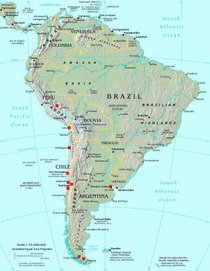"Chileno"
When I first told people that I was studying in Chile, a lot of the responses that I got had to do with the "quality" of Spanish that I would be learning. People assumed (not know a lot about South America I guess), that Chileans would speak good, clear, Spanish that would be the best to learn from. This couldn't be farther from the truth.
There is a big joke among us exchange students here that we arn't actually learning Spanish, we are learning "Chileno." That is to say, we are learning all the "Chilenismos," (Chilean slag/ colloquialisms) rather than Spanish that will be practical with any other Spanish speakers. However, the Chileans keep trying to tell us that if we can understand "Chileno," we can understand any Spanish from any country.
I've come to realize lately how many chilenismos I use everyday, in every sentence, and I fear not being understood by anyone other than Chileans in the future.
To demonstrate, I came up with a dialogue using chilenismos, featured in bold.
[Phone rings]
A: Alo? [Hello?]
B: Habla B. ["B" here.]
A: Hola B, que onda? Donde estai? [Hey B, what's up? Where are you?]
B: Nada, toy en la micro. [Nothing, I'm on the bus.]
A: Ya po. [Oh, ok.]
B: Vengo al tiro a tu departamento. Estai? [I'll be at your apartment in a second. Are you there?]
A: Si po, weon. [Yeah, man.]
B: Bueno, ya! Nos vemos ahi po. [Alright! I'll see you there!]
A: Si po. Chau! [Yup. Bye!]
B: Chau! [Bye!]
Almost an entire conversation can be had using just chilenismos...
Here are some other favorites/ explanations:
po - used at the ends of phrases for emphasis, but always comes before "huevon" (weon). Apparently comes from the word 'pues' [well], and is used all the time with people of all social classes. [Pero tu no estuviste alla, po!]
huevon - pronounced "weon," basically means 'dude' or 'man,' and Chileans use it at the end of every phrase (almost). [Oye weon, ke estas haciendo?]
cachai - "Got it?" A fabulous interjection in conversations used to make sure people are still understanding what you are talking about, or placed at the end of an idea, a question.
tocar el violin - I thought someone was actually telling me they play the violin... it really means to be the third wheel or odd man out in romantic situations. [No quiero ir, voy a tocar el violin.]
fome - boring, but I like using it where I would use "lame" in English. [Pero que fome que no vas a salir!]
la raja - awesome
bacan - cool
carrete - party at a club/bar or at someone's house/apartment
luca - 1.000 pesos
gamba - 100 pesos
chela - beer
copete - drink
These are just a few of the most common examples that a gringa has picked up on and the first ones that came to mind when writing this. But Chileans use so many more when the talk amongst themselves that it really is harder to understand them, not to mention how fast they talk.
Although they may have no value in my "Spanish future" getting to know all this slang has been a great part of the culture here and the words are just so fun!! More than finding people to speak Spanish to later on, I want to find people I can speak Chilean with po, weon!! [Oops, it's slipping into my English vocab...]


3 comments:
haha...tocar el violin....that's amazing
That was a very amusing entry.....estoy riendo!
hahaha true, but a lot of these are also used in other countries... some that are used in other countries have other meanings... oh the joy of learning spanish!
Post a Comment